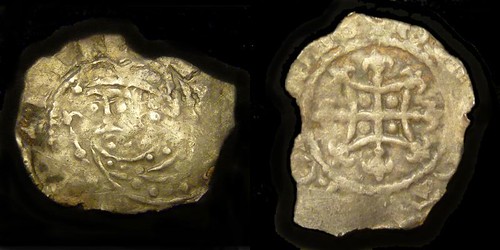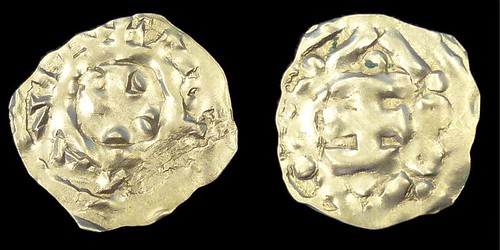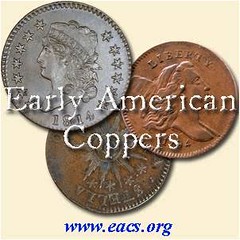
PREV ARTICLE
NEXT ARTICLE
FULL ISSUE
PREV FULL ISSUE
MONEYERS AND DEBASEMENT IN MEDIEVAL ENGLANDI noticed a nice article posted to the CoinTalk Forum by Medievalist FitzNagel. Here's an excerpt. -Editor
"All the moneyers who were in England should be mutilated" This was the order given by King Henry I in 1125. Specifically, they should each "lose their right hand and be castrated."1 According to the Anglo-Saxon Chronicle, Bishop Roger of Salisbury rounded up the moneyers in the city of Winchester and carried out the grizzly order. Henry actually had a history of difficulty with the mints of England. Around 1108, Henry ordered that all coins from the mint should be 'snicked;' cut or mutilated before leaving the mint. The coins in circulation were being cut to test their purity, and this caused many to not accept the coins, since portions were cut off and made the coins a lesser weight. Henry's solution was for the creation of round half-pennies, and for every full penny to come pre-cut. In the case of 1125, the Coinage was becoming very debased. In fact, the Chronicler praises Henry's punishment of the moneyers, saying the action was justified because "the man who had a pound could not get a pennyworth at a market." In some ways, the moneyers almost couldn't be blamed. There had not been any serious silver deposits found in Europe since 1040, and the silver of Europe was primarily draining towards Italy and the East through trade. The silver supply would be further strained by the continued Anglo-Saxon practice of requiring a recoinage every few years. By only permitting the newest type to be used to pay fines or royal rents, this required people to exchange their coins, and the moneyers could charge a fee for the privilege. A portion of that fee would go to the king, and if a lower finesse was used in the new coinage, then more profits could be made. People would naturally hold on to older, more fine coins for personal transactions, and it would seem to the moneyers that the supply of silver was seriously dwindling. The documentary evidence of Henry's decree concerning the moneyers lends evidence to dating his coins. M.A.S. Blackburn conducted a study of the types of Henry's coins and attempted to lend a chronology to them.6 One of the few certain types were those of 'Type 15' containing a Quadrilateral on Cross Fleury on the reverse. These are fairly certain to have been minted after the purge of the moneyers in 1125, as the number of mints and moneyers who produced these coins dropped dramatically from previous issues. I managed to stumble across one of these type 15 coins recently. It's certainly not pretty, but few of the affordable issues of Henry I are. While the flan is very irregular and damaged, the king's portrait is clear, and there is just enough of the legend on the reverse to make out the mint and moneyer.  Henry I, Bury St. Edmunds AR Penny The order to mutilate the moneyers seems to have come as a result of events happening in Normandy. Henry had wrested the Duchy from his eldest brother, Robert Curthose, when the latter went off on Crusade. Robert's son, William Clito, naturally resisted when given the opportunity. According to Robert de Torigni, a chronicler from Mont St. Michel, some money from England had arrived to pay his soldiers who were fighting Clito and a rebellious count. According to de Torigni, "...almost all the moneyers of the English kingdom produced, I do not know by what wicked perversity, money out of tin containing scarcely one-third of silver, whereas it should have consisted of pure silver." This is interesting not only because de Torigni is another chronicler who praised Henry's actions, but that we have another reason why silver was leaving England. Normandy had their own coinage, and were not reliant on England to provide pay for soldiers.  French Feudal, Normandy Henry I, r. 1106-1135 To read the complete article, see: Wayne Homren, Editor The Numismatic Bibliomania Society is a non-profit organization promoting numismatic literature. See our web site at coinbooks.org. To submit items for publication in The E-Sylum, write to the Editor at this address: whomren@gmail.com To subscribe go to: https://my.binhost.com/lists/listinfo/esylum All Rights Reserved. NBS Home Page Contact the NBS webmaster 
|

